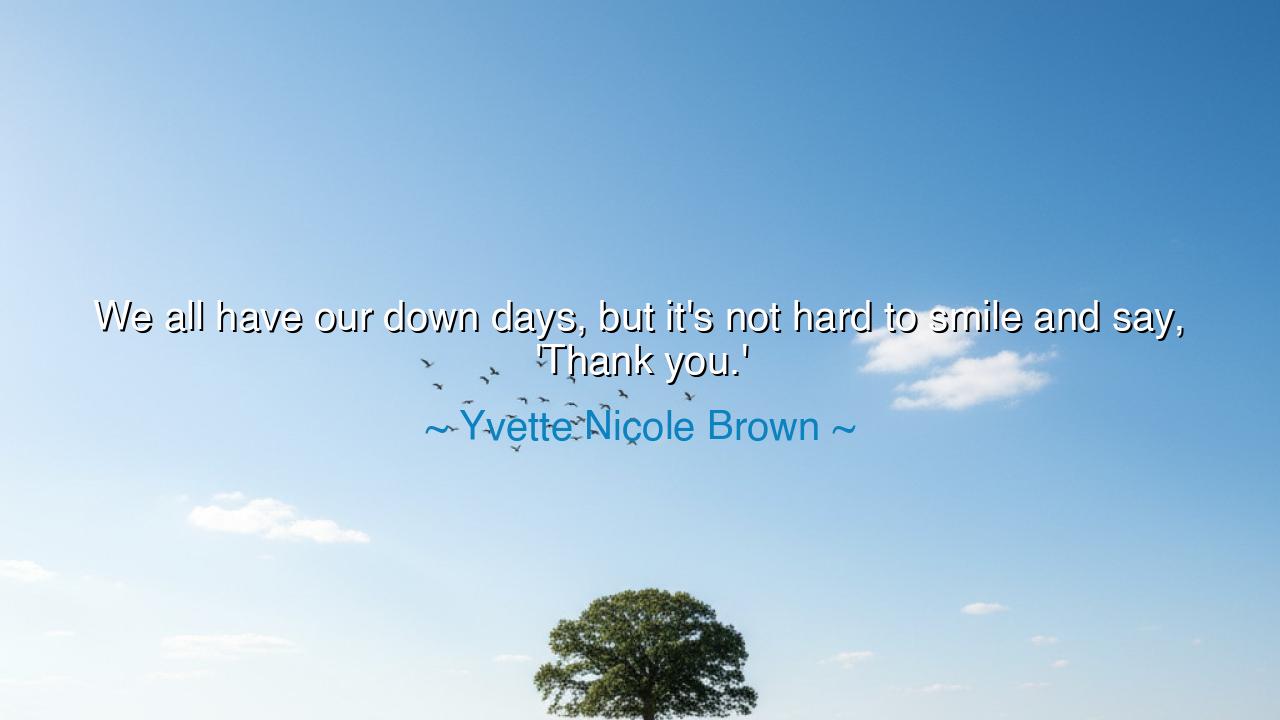
We all have our down days, but it's not hard to smile and say






Hear, O seeker of wisdom, the words spoken by Yvette Nicole Brown: “We all have our down days, but it’s not hard to smile and say, ‘Thank you.’” This utterance is not light or trivial, but heavy with truth. For in its simplicity, it speaks to the ancient struggle of the human soul—the battle between despair and gratitude, between sorrow and strength. It reminds us that though shadows may fall upon our hearts, the choice of gratitude still lies within our grasp. And gratitude, once chosen, is like a spark that chases darkness from the cavern of the spirit.
The origin of this truth is older than the speaker herself. Across the ages, sages, prophets, and philosophers have proclaimed that to give thanks is the surest way to rise above suffering. Yvette Nicole Brown, in her gentle wisdom, has clothed this eternal teaching in modern words. She names the “down days”, those seasons when life bends our shoulders low. Yet she offers the remedy—not wealth, nor fame, nor power, but the simple act of smiling and saying “Thank you.” Gratitude becomes both shield and sword: it shields the heart from bitterness, and it cuts through the thorns of despair.
Consider the story of Viktor Frankl, survivor of the Nazi concentration camps, who endured horrors beyond imagination. In his writings, he shared that even in the midst of unspeakable suffering, he found meaning and moments of light when he chose to be grateful—for a memory of his wife, for the sight of a sunset, for the chance to offer another prisoner a kind word. Here we see Yvette’s teaching in action: though the day was cruel, he smiled in his heart and whispered “Thank you.” And in that small act, he reclaimed his humanity, refusing to let despair devour him.
The ancients, too, knew this power. The Stoics of Greece and Rome taught that man cannot control the winds of fate, but he can command the sails of his soul. They declared that even in pain, the wise man finds reason to give thanks: for life itself, for the chance to endure, for the opportunity to show courage. The teaching echoes like a river through time, and Brown’s words are its modern ripple. Gratitude is the eternal antidote to sorrow.
Yet let us not mistake this for denial of pain. To have “down days” is no shame. To weep, to falter, to ache—these are the marks of living flesh and a tender heart. But when the storm has passed, when breath still lingers in the chest, one may lift the head and choose to smile. That smile, even if trembling, is an act of defiance against despair. The whispered “Thank you” is not weakness, but victory—it proclaims: “Though struck down, I still rise. Though tested, I remain unbroken.”
What lesson, then, shall the reader take from this teaching? It is this: let every day, even the darkest, hold some seed of thanks. When the burden of labor weighs heavy, be grateful for the strength to bear it. When loneliness comes, be thankful for the memories of love once known. When the road is long and weary, be grateful that you still have feet to walk it. For every breath is a gift, and every dawn another chance to begin again.
And what actions should one take? Begin small. Each morning, before the day unfolds its trials, whisper a word of thanks—for the air, for the light, for the chance to live once more. When sorrow comes, do not silence it, but after its voice has spoken, respond with gratitude. Write down one blessing each night, no matter how small: a smile from a stranger, a cup of warm tea, the gift of rest. In time, these practices will train the soul to see light even when the path is dark.
Thus, O children of tomorrow, hold fast to this teaching: “We all have our down days, but it’s not hard to smile and say, ‘Thank you.’” Let these words be as a lamp to your path. Remember always that gratitude is not the denial of sorrow, but the triumph over it. For the soul that gives thanks cannot be conquered, and the heart that smiles in hardship is already victorious.






AAdministratorAdministrator
Welcome, honored guests. Please leave a comment, we will respond soon